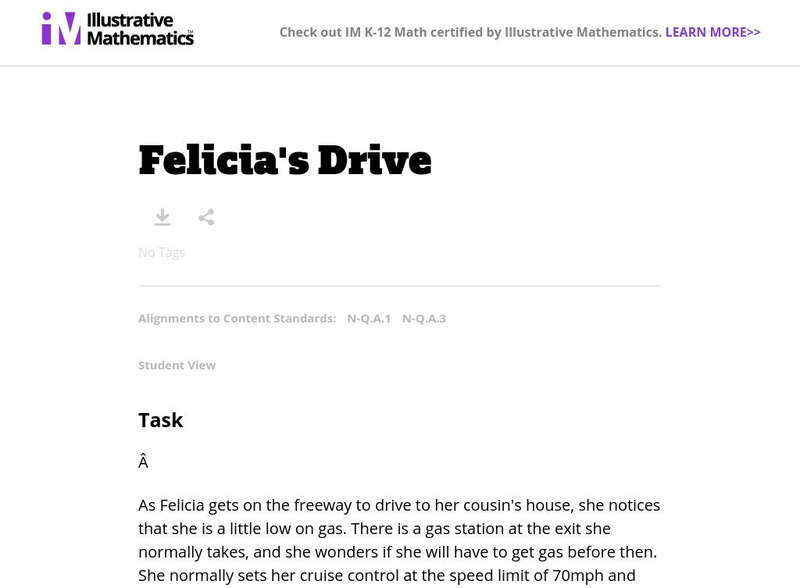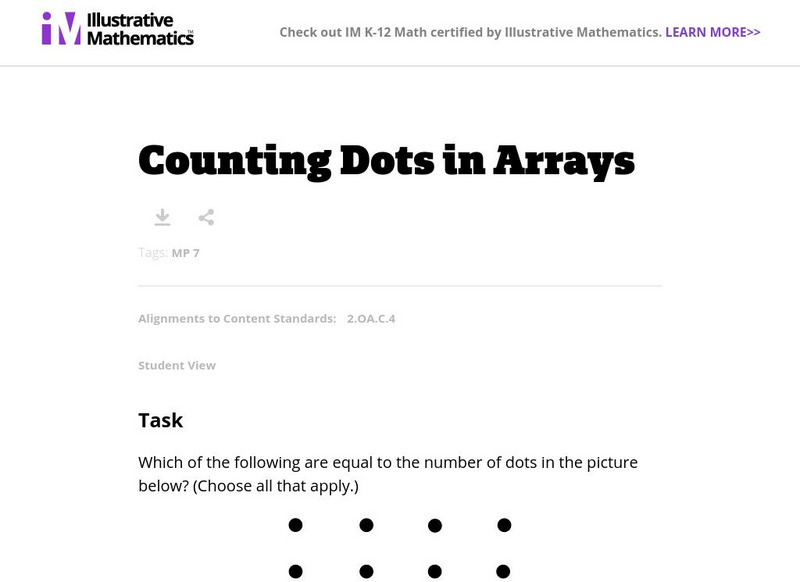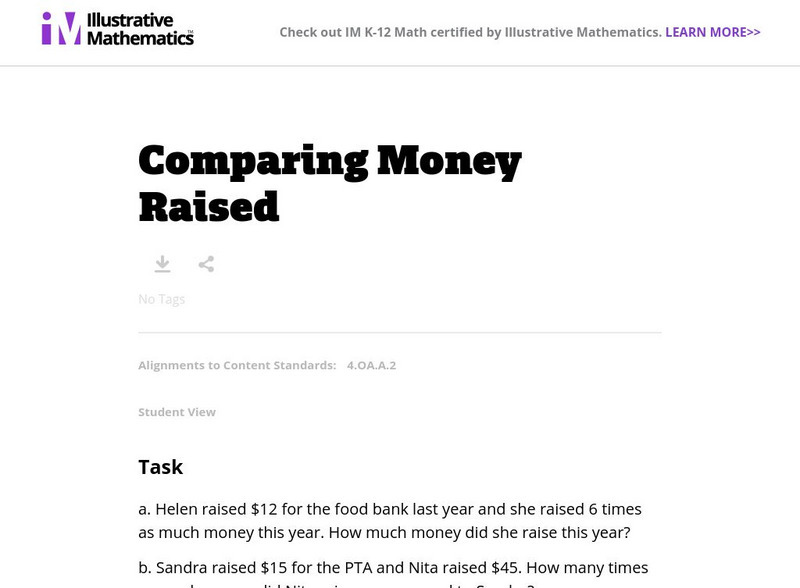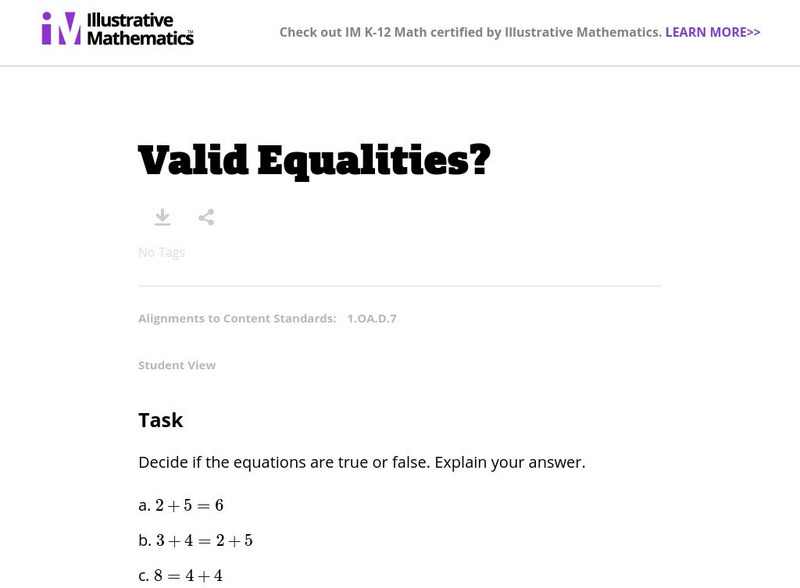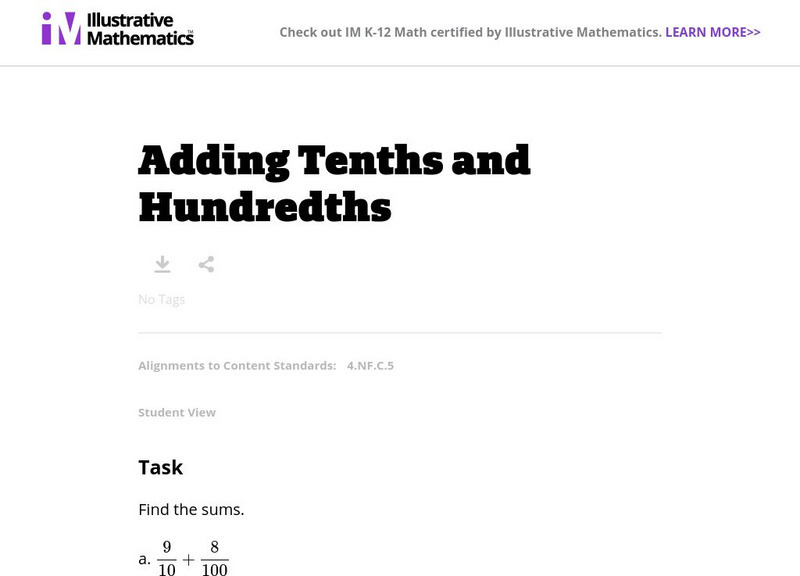Illustrative Mathematics
Illustrative Mathematics: 6.g Polygons in the Coordinate Plane
The purpose of this task is for students to practice plotting points in the coordinate plane and finding the areas of polygons. This task assumes that students already understand how to find areas of polygons by decomposing them into...
Illustrative Mathematics
Illustrative Mathematics: Salad Dressing
The purpose of this task is to have students add fractions with unlike denominators and divide a unit fraction by a whole number. This accessible real-life context provides students with an opportunity to apply their understanding of...
Illustrative Mathematics
Illustrative Mathematics: 6.ee Watch Out for Parentheses
This problem asks the student to evaluate three numerical expressions that contain the same integers yet have differing results due to placement of parentheses. Aligns with 6.EE.A.
Illustrative Mathematics
Illustrative Mathematics: 6.ee,rp 7.ee,rp Anna in d.c.
The purpose of this task is to give students an opportunity to solve a multi-step percentage problem that can be approached in many ways. Because the tax and tip in this problem are a fixed percentage of the cost of the meal, the total...
Illustrative Mathematics
Illustrative Mathematics: 6.ee Busy Day
This problem can be solved using simple arithmetical reasoning but is also naturally represented by a simple equation. Thus, it provides a good entry point for students into representing quantities in contexts with variables and...
Illustrative Mathematics
Illustrative Mathematics: 5.nf How Many Marbles?
This task is intended to complement "5.NF How many servings of oatmeal?" and "7.RP Molly's run.'' All three tasks address the division problem 4/13 but from different points of view. Aligns with 5.NF.B.7.b.
Illustrative Mathematics
Illustrative Mathematics: 6.ee Morning Walk
This task presents a straight forward question that can be solved using an equation in one variable. The numbers are complicated enough so that it is natural to set up an equation rather than solve the problem in one's head. Aligns with...
Illustrative Mathematics
Illustrative Mathematics: 7.rp Tax and Tip
This site provides a problem with completed solutions for that problem. This problem covers the topic of sales tax and tips. The problem aligns with 7.RP.A.3.
Illustrative Mathematics
Illustrative Mathematics: 7.rp Walk a Thon 2
The purpose of this task is for students to translate information about a context involving constant speed into information presented in a table and to find the time it takes to travel a unit distance as well as the distance traveled per...
Illustrative Mathematics
Illustrative Mathematics: N q.a.1 and N q.a.3: Felicia's Drive
This task requires students to make some sensible approximations of the amount of gas needed for a drive. They must choose a level of accuracy appropriate to limitations on measurement when reporting quantities. Aligns with N-Q.A.1 and...
Illustrative Mathematics
Illustrative Mathematics: 5.md: Breaking Apart Composite Solids
This exercise helps students understand how volume in figured, even when two or more parts of a prism are not overlapping. There is a teacher view, with a description of the activity and commentary, and a student view, with just the...
Illustrative Mathematics
Illustrative Mathematics: 4.g the Geometry of Letters
Letters can be thought of as geometric figures. Aligns with 4.G.A.1.
Illustrative Mathematics
Illustrative Mathematics: 4.nf Explaining Fraction Equivalence With Pictures
The purpose of this task is to provide students with an opportunity to explain fraction equivalence through visual models in a particular example. Part (c) should be approached as a discussion before students are asked to write an...
Illustrative Mathematics
Illustrative Mathematics: 4.nf Using Benchmarks to Compare Fractions
Melissa gives her classmates the following explanation for comparing fractions.
Illustrative Mathematics
Illustrative Mathematics: Rounding to Tenths and Hundredths
The purpose of this task is for students to use the position of a number on the number line to round the number without knowing its exact value. Though this task deals most directly with rounding, it also requires students to understand...
Illustrative Mathematics
Illustrative Mathematics: Counting Dots in Arrays
This activity addresses CCSS 2.OA.C.4 where students count dots in an array using repeated addition. This skill lays the foundation for an understanding of multiplication.
Illustrative Mathematics
Illustrative Mathematics: 4.oa Comparing Money Raised
The purpose of this task is for students to solve three comparisons problems that are related by their context but are structurally different. Multiplicative comparison is purposefully excluded from third grade (see 3.OA.3 and 3.MD.2),...
Illustrative Mathematics
Illustrative Mathematics: 4.nf Cynthia's Perfect Punch
Cynthia is making her famous "Perfect Punch" for a party. After looking through the recipe, Cynthia explores mixed numbers to create it.
Illustrative Mathematics
Illustrative Mathematics: 1.oa Using Lengths to Represent Equality
In this lesson plan, 1st graders determine if lengths are equal to one another.
Illustrative Mathematics
Illustrative Mathematics: 1.oa Valid Equalities?
This lesson plans allows students to explore the meaning of the equal sign in addition and subtraction problems.
Illustrative Mathematics
Illustrative Mathematics: Fractions on a Line Plot
Students will play a game with a partner to create a line plot with fractions.
Illustrative Mathematics
Illustrative Mathematics: 4.nf Adding Tenths and Hundredths
Find the sums. Aligns with 4.NF.C.5.
Illustrative Mathematics
Illustrative Mathematics: S cp.a.4, S cp.a.5 and S cp.b.6: The Titanic 3
On April 15, 1912, the Titanic struck an iceberg and rapidly sank with only 710 of her 2,204 passengers and crew surviving. Some believe that the rescue procedures favored the wealthier first class passengers. Other believe that the...
Illustrative Mathematics
Illustrative Mathematics: g.co Reflections and Isosceles Triangles
This task has students link their intuitive notions of symmetries of a triangle with statements proving that said triangle is unmoved by applying certain rigid transformations. The mechanism through which students do this is via...



